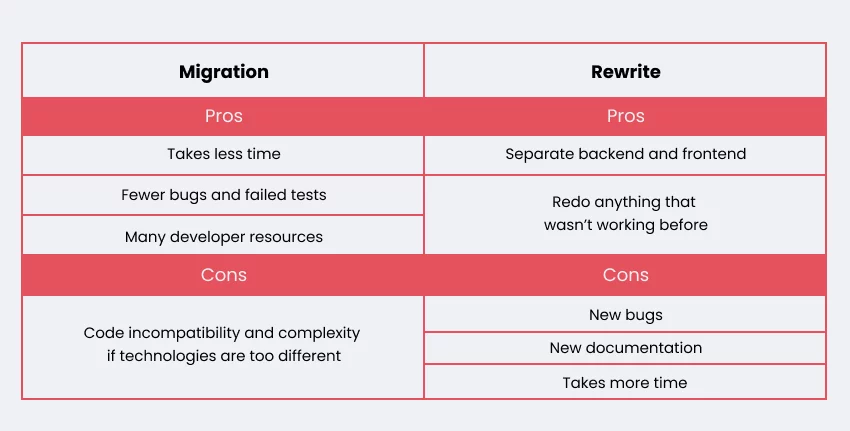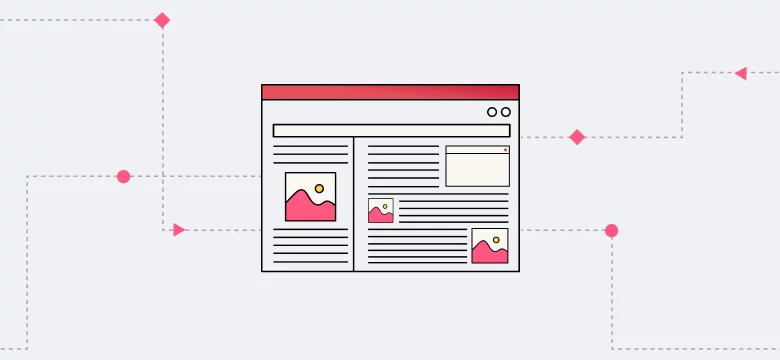Outdated Frontend: Should You Migrate or Rewrite?
Businesses with products that have outdated frontend frameworks have a big decision to make. Should they migrate their code to a newer framework or completely rewrite the whole thing?
In this article, we will take a look at the pros and cons of rewriting, the pros and cons of code migration, and how to carry out the process of updating your product.
Migrating vs rewriting Angular project
An outdated frontend framework is one that is no longer worked on or maintained by the team that created it. This means, more or less, that the technology has no technical support, no updates, and nobody responsible for addressing any issues or bugs within the framework.
Once you know your business is relying on a product with an outdated framework, the next step is to figure out the best way to modernize it. With a web application, you have two options – you can migrate the code of your product onto a new technology or you can rewrite the entire thing.
Let’s compare the two processes and see which one will benefit you the most.
Advantages of rewriting an application
The main advantage of rewriting an application from scratch is that you can factor in separating the backend and frontend in most applications. By splitting the two, you can modernize the frontend and keep the old backend, or you can modernize the backend and keep the frontend the way it is.
Rewriting an application will also enable you to completely redo any features or errors that weren’t working before. You won’t have to fix existing parts of the code but start over.
Another business benefit is that it will be much easier to recruit developers. A new technology will not only bring new energy and motivation to your current team but also attract skilled and ambitious developers.
Disadvantages of rewriting an Angular application
The biggest downside of rewriting is the time you will have to spend on development. Because everything will be redone from scratch, it will take developers a lot longer to write the code. This also means that the process will cost more since you are using more resources to create the application.
A longer process also means that your users might turn to other products. The IT industry moves quickly and so do your competitors. If a competitor has a ready-to-use application, your users are likely to choose them when they get tired of waiting for your application to relaunch. So when you launch your modernized application, the number of users you have is likely to decrease. It’s important to note that you will also have to maintain the old application during the rewrite process so it’s extremely beneficial if an outside team is handing the rewrite.
You also have to consider the new bugs you will face and all the new documentation you will have to produce. The team will have to deal with new bugs, errors, and multiple failed tests. Figuring out how to tackle these will take time and a lot of effort from the developers.

Advantages of migrating an Angular application
When developers migrate code, the application has fewer errors and bugs when compared to rewriting. The developers also have a wide variety of libraries available to them that they can use as support during the migration process. They can access information on how to ensure the application will migrate smoothly, how to avoid mistakes, and how to deal with challenges that arise.
You also gain an additional benefit if the outdated technology is similar to the modern technology you are migrating to. The developers put in charge will be able to read the legacy code with a lot more ease and migrate it even quicker. Therefore the application will be ready for a relaunch sooner.
Disadvantages of migrating an application
If the technology you’re migrating to is vastly different from the technology your product is built with, the migration process will be complex, long, and possibly painful for developers.
Developers will face challenges such as complicated bugs, code incompatibility, and inconsistency, and can find themselves doing a lot of rewriting code instead of migrating.
Can you migrate every Angular application?
Unfortunately, no. As outlined in the above section, there are many disadvantages that can come with migration if the new technology is incompatible with your current technology. That may be due to the fact that your product framework is simply too outdated to modernize or because the team has to deal with entirely different frameworks.
Before deciding to migrate, your business needs to know whether the migration process is something that you should invest in. It’s crucial to figure out whether the new technology is compatible with your old framework and with your business goals, or whether it is simply not worth it.
An audit is a quick way to make a decision on whether you should migrate your application. Our team of experts can help you figure out if migrating is right for you. We can carry out a small audit that will let you know what will be best for your business.
What kind of apps should you migrate to Angular?
When you are planning a migration, Angular is one of the modern technologies that you can consider for your product. Let’s take a look at what applications you can migrate to Angular and why you should do so.
- B2B applications. These types of apps fit right into the Angular framework. The technology is ideal for large enterprise applications due to its components and scalability. In fact, it’s most commonly chosen for web applications.
- AngularJS applications. Migrating an AngularJS application to Angular will be smooth and simple due to similarities in the code. The two are often mistaken for the same technology, and despite being two different frameworks, they are alike enough for the migration to be beneficial for applications and your business.
- Applications with a frontend/backend split. If you are considering splitting the backend from the frontend prior to migrating, Angular will also be a good choice. Your team can migrate the frontend portion to Angular and the backend can remain unchanged. This split will also enable an API that can be used by a mobile application.
What about mobile apps? Unfortunately, we don’t recommend migrating your application to Angular if you have a B2C mobile application. Due to missing mobile-friendly components, Angular will cause changes in the UI of the app, which will be challenging and time-consuming to fix.
Why you should migrate your application to Angular
Out of all the frontend frameworks, Angular is one of the strongest competitors on the market. The components it provides developers make it a perfect fit for web applications to be user-friendly, reliable, and scalable.
Let’s take a look at the main reasons why migrating to Angular will benefit your business.
- Safe and reliable. Because Angular is the framework created and supported by Google, each of its components has been tested enough times to ensure you and your users can feel comfortable trusting apps built with Angular. Google releases new versions of Angular and frequent updates each year that address any errors or bugs. They act quickly to take care of any vulnerabilities in the framework code before they can reach your app and hurt your and your users’ data.
- A long-term solution. Angular has been around for quite some time and yet it’s still considered a modern framework. The Google team is dedicated to making sure it stays that way. The team ensures the framework is continually updated and keeps up with the latest trends. It consistently has new functionalities and features that make Angular apps up-to-date. This means that once you migrate to Angular, you won’t have to worry about migrating anytime soon. You will be able to stay with Angular for a long time.
- Scalable. If you need to scale your Angular application, you can easily do so just using the Angular technology. Angular is a modular framework with code consistency and structure, making apps easily scalable. The framework also has features that ensure an application that has been scaled won’t have issues with performance but will have the same rich user experience as before.
- High-quality developers. Angular is a unique enough technology that requires developers to be ambitious and highly skilled. Since it’s not the easiest technology to master, Angular developers are statistically very high quality in comparison to other specializations. That means they will ensure your product is the best it can be so you can meet any business goals you set out to achieve.
Summary
The significant difference between the migration and rewrite processes is that one takes a shorter period of time, and therefore is less costly. However, the option that is best for your business depends on the technology your product is built with. If the new framework is similar to your old one, migration will be simple and straightforward. If they differ majorly, a rewrite is the better option.



